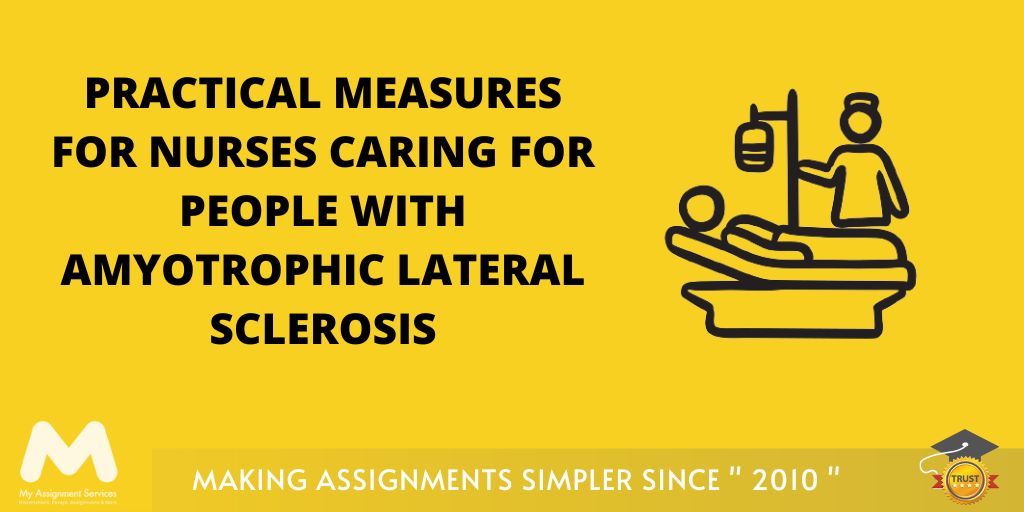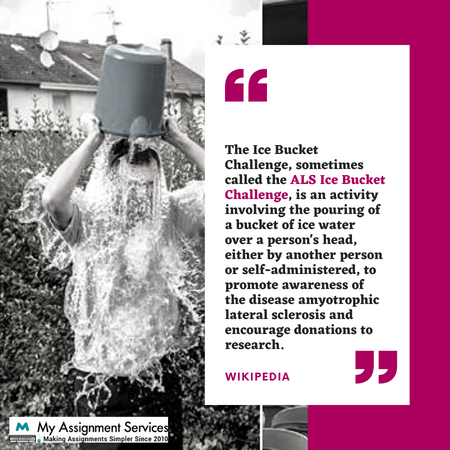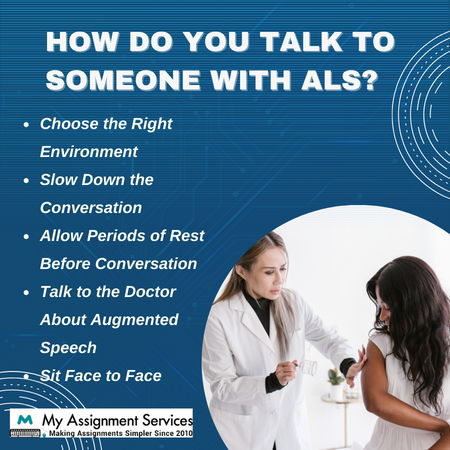Practical Measures for Nurses Caring for People with Amyotrophic Lateral Sclerosis

As a nursing student, you must be aware of all the issues the patients go through a nervous system conditions. Only a small portion of the general population is aware of such conditions’ ALS or “Amyotrophic Lateral Sclerosis” is one such condition. The motor nerves connect the spinal cord to the brain and are responsible for all the voluntary movements.
First identified in 1869, ALS was discovered by Neurologist Jean-Martin through autopsy. - Wikipedia
The motor neurons degenerate with age, but degeneration time moves faster for ASL patients. The patients lose their muscle movements due to the untimely degeneration of the motor nerves. People with ALS often lose their ability to move, eat, speak and even breathe, as the voluntary muscle movement is affected greatly due to the loss of motor nerves.
The initial symptoms of ASL include muscle twitching, weakness in lima or slurred speech. Although these are some common symptoms still the
Tag along to get in-depth information about ALS.

What Are Amyotrophic Lateral Sclerosis Causes?
The apparent cause of ASL is still unknown. Researchers have spent decades trying to decipher what makes the neurons die; gene mutation is speculated to be the reason behind 5-10% of the ASL cases. There are several changes in the ASL patient’s physical state, and hence, researchers have developed hypotheses concerning the causes, which are:
Genetic reasons
Familial ASL has affected nearly five per cent of the overall cases. One of the reasons the cause of ASL is a genetic mutation. The generation of the protein SOD1 in the gene is toxic for the motor neurons. Several other genetic reasons are associated with ASL, and hence we can say it is caused due to the genes not functioning optimally.
Immune system problems
The immune system is responsible for keeping foreign bacteria and viruses away from the body. Microglia is a cell in the immune system responsible for destroying viruses and bacteria. Still, the microglia destroying the healthy motor neurons might be the reason for Amyotrophic Lateral Sclerosis.
Mitochondria problems
Also known as the “powerhouse of the cell”, mitochondria are responsible for generating energy for the cell functions. The mitochondrial fragmentation can change the cell’s morphology and kill the motor nerves leading to ASL.
Oxidative stress
Another supposed reason for ASL is the malfunctioning of the cell functions due to the production of radicals - a toxic substance produced by the cell when generating energy. This is yet another reason for the damages the cell may incur, thus causing the nerve cells to die.
Environmental causes
Researchers have also postulated that environmental stress can be a reason behind ASL. A study proves that people who served in the 1991 Gulf War have developed ASL. This can be due to coming into contact with certain germ or bacteria.
"A" is Greek for no, and "myo" translates to muscle. "Trophic" refer to nourishment in Greek as well; hence, amyotrophic combines mean "no muscle nourishment”. Additionally, "atrophies" means waste away and "Lateral" is the nerve cells' positioned at the spinal cord for controlling body movements. "Sclerosis" means the hardening of the region.
The apparent cause of ASL is still unknown. Medical researchers are unaware of why ASL affects some and not others. Still, various scientific proofs suggest that it is caused due to genetics and other environmental causes. The research for a reason behind the degeneration of the motor nerves is still underway and has progressed a bit with the discovery of a third gene that might be the cause.
Nursing students struggle with completing their assignments. There can be many reasons, like a lack of time or reference materials, inadequate knowledge of the subject, and formatting difficulties. If you're going through the same, you can get free resources and affordable assignment assistance from professionals in the healthcare sector. Fill out the enrolment form to get nursing assignment help today.
What Are Usually the First Amyotrophic Lateral Sclerosis Symptoms?
ASL is a disorder previously known by lesser people, and the symptoms are initially similar to some common issues. Therefore, it gets difficult to track it in the early stages. Some initial symptoms include:
- Twitching muscles - in the limbs, neck, or tongue
- Cramps in muscles
- Spasticity or stiffness in muscles
- Muscle weakness until the limbs, neck or diaphragm stop working
- Slurred speech due to lack of tongue and nasal muscle control
- Unable or difficult to chew or swallow
The initial sign of ASL symptoms can be seen in the arm or leg, hindering small tasks like writing or buttoning up a shirt. Often people with such symptoms get imbalanced or fall when walking due to the same limb issues. This stage is called “limb onset”; when the individual shows issues with nasal or speech control, it is the “bulbar onset” stage.
As amyotrophic lateral sclerosis progresses, the patient’s muscle atrophy spreads to other body parts and organs. Issues with moving or swallowing are the next stage termed as “dysphagia”. Losing speech control is ‘dysarthria’, and the extreme condition is losing breathing movements “dyspnoea".
Did you know that ALS became widely known only after it ended the career of baseball star Lou Gehrig in 1939? For a long time, it was called Lou Gehrig’s Disease.
The sequences of developments of the symptoms and disease progression vary from person to person. Although people lose muscle control and physical abilities, their brains can still remember, reason, understand and are aware of their condition. Only a very small percentage of cases have developed dementia.

How to Caring for Someone with ALS?
While it's demanding, caring for someone with ALS can be fulfilling if you have the right mind-set, support from others, and proper assistive devices. Here are a few tips to keep in mind as you navigate through your caregiving journey. Follow these tips to better care for your loved ones or someone with ALS:
- Empower yourself by gaining more knowledge on the condition. Know all the basics so you can understand the patient’s condition better. For example, in amyotrophic lateral sclerosis, the muscle atrophy stage determines the needed type of care.
- Seek support or assistance from experienced caregivers or medical professionals. You can support the person by visiting the hospital and asking questions about their condition.
- Medications and physical therapy help ASL patients with slowing down the muscle atrophy process. With such assistance, they can move independently and stay active for as long as possible.
- Occupational therapy is useful for people who wish to work and lead a normal life regardless of their condition. Besides more physically challenging tasks, the occupational therapist can help the patients carry out daily tasks through different movements.
- Look into skilled nursing specialised in amyotrophic lateral sclerosis when the patient has reached bulbar onset as the patient will need medical intervention. A skilled medical professional will help the patient with their medication and nutrition as long as needed.
Did the ALS ice bucket challenge raise over a hundred million dollars in just thirty days?
The person with ALS and their families suffer much emotional damage as they must adjust to the changes in their lives to meet the patient's needs. With the proper medication, muscle control loss can be slowed down by two years. It is often the best emotionally draining for the families and close ones to see the patient’s condition deteriorate. Yet it is important to keep the routine and help patients retain their muscle functions.
Nursing is a rigorous field, and students must complete several projects such as lab reports, case studies, and reflection writing. Sustaining with theory and practice is difficult, therefore if you need nursing assignment help, talk to one of our professionals for insight on complicated ideas and live supervised tutorials. Fill out the enrolment form to get started today.
Related Study Materials
Our Experts can answer your Assignment questions instantly.
Ask Question0 Comment
![]()









Loved reading this Blog? Share your valuable thoughts in the comment section.
Add comment